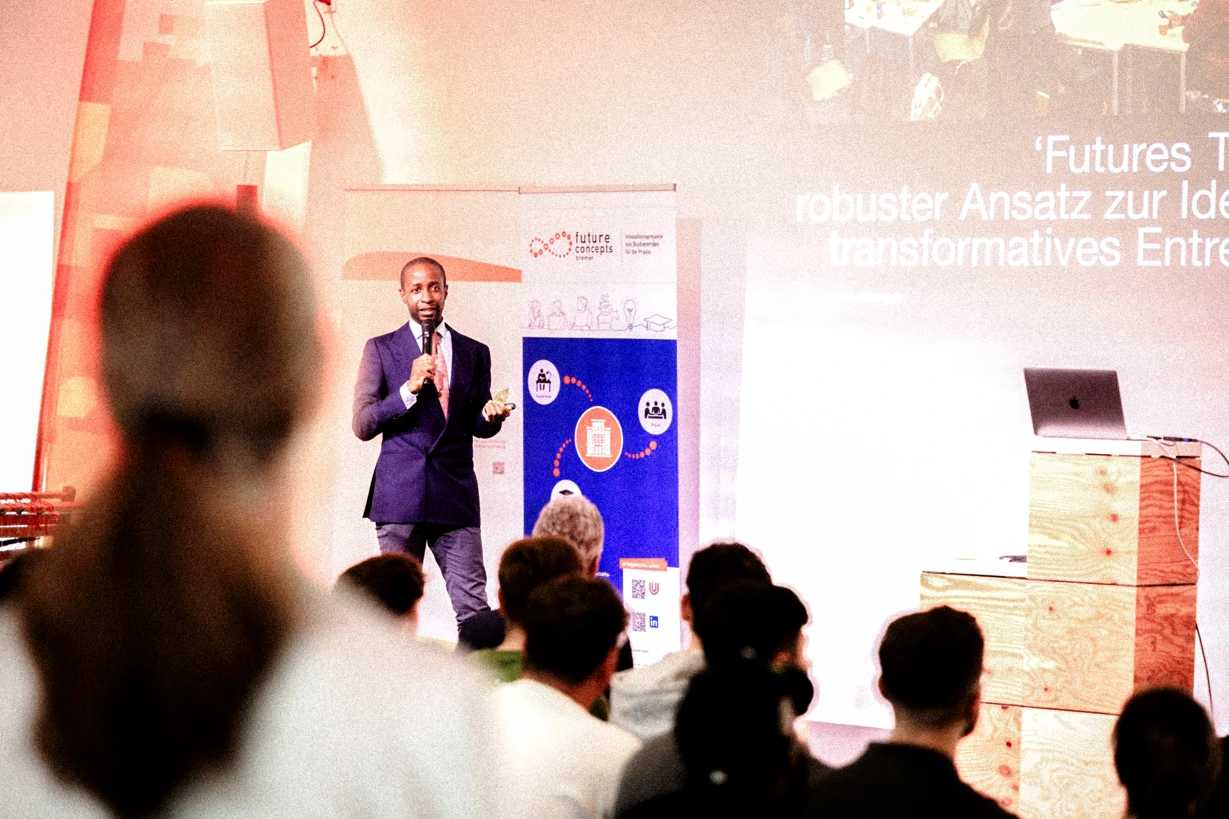Doing Futures: Futures Thinking for Entrepreneurship
- September 2, 2025
"In innovation, not speed moves us forward—but direction."
“In innovation, not speed moves us forward—but direction.”
This insight struck me in a recent conversation. It voiced a deep-held disenchantment with a field I’ve devoted a decade of my working life to.
Innovation is moving fast, but nowhere. Instead of contributing to large-scale societal transformation, innovation and entrepreneurship—particularly in its most popular Silicon Valley form—are accelerating societies towards human, economic, and ecological collapse, by design.
I am a dual citizen of both spaces: futures-foresight and innovation-entrepreneurship. At first glance, the disciplines appear to be a natural fit. Futures informs our understanding of change and activates anticipatory behaviours and attitudes. Innovation, as its creative vessel, animates the opportunities inherent in change, every day.
What corrupts this ideal? In organisations, silos pose rigid barriers between these twin disciplines, reinforced by cultural tensions best described through allegedly different modes of thinking: long-term vs. short-term; and deeply rooted narratives—the critical genius of the, but unproductive, intellectual vs. the busy, opportunistic, yet myopic, hustler.
Traditional foresight methodologies are best suited to large corporates and government bureaucracies—organisations heavily invested in prolonging business as usual. This preference for the incremental over the radical (Latin: from the roots) was best described by the Innovator’s Dilemma.
For entrepreneurial management, it’s clear: the small business, or the new venture, are not a corporate in miniature—they are fundamentally different economic creatures. Thus, in such contexts, corporate foresight is highly ineffective, with non-consumption as its consequence.
Although I regard the age of the centralised corporate and large bureaucracy as passé, I believe minimalist companies form the backbone of tomorrow’s economies. As such, innovators, regardless of sector or background, whether for- or non-profit, need to be equipped for their challenging role in supporting societal transformations.
Here, I am convinced: futures are the missing compass—giving direction where innovation has mistaken speed for progress. They serve as a guiding post for compelling visions of tomorrow’s lifeworlds and societies—and, to realise them, small businesses (rather than cash‑heavy corporates or unicorn tech firms) are the mechanism that enables economic democracy and participation. Remember: in innovation, not speed moves, or motivate, us to advance—but its direction. For that matter, re-endowing entrepreneurial innovation with the lost art of the long view arises as the my mission critical challenge.
Adapting futures for that very purpose of “doing”, through entrepreneurial means, practices and management, arose as a consequence as source of opportunity
In the next days and weeks I will publish more lengthy thoughts, reveal studies and most of all, share tools and methods that support the transformational innovator and entrepreneur in individual and collective endevours.
“In innovation, not speed moves us forward—but direction.”
This insight struck me in a recent conversation. It voiced a deep-held disenchantment with a field I’ve devoted a decade of my working life to.
Innovation is moving fast, but nowhere. Instead of contributing to large-scale societal transformation, innovation and entrepreneurship—particularly in its most popular Silicon Valley form—are accelerating societies towards human, economic, and ecological collapse, by design.
I am a dual citizen of both spaces: futures-foresight and innovation-entrepreneurship. At first glance, the disciplines appear to be a natural fit. Futures informs our understanding of change and activates anticipatory behaviours and attitudes. Innovation, as its creative vessel, animates the opportunities inherent in change, every day.
What corrupts this ideal? In organisations, silos pose rigid barriers between these twin disciplines, reinforced by cultural tensions best described through allegedly different modes of thinking: long-term vs. short-term; and deeply rooted narratives—the critical genius of the, but unproductive, intellectual vs. the busy, opportunistic, yet myopic, hustler.
Traditional foresight methodologies are best suited to large corporates and government bureaucracies—organisations heavily invested in prolonging business as usual. This preference for the incremental over the radical (Latin: from the roots) was best described by the Innovator’s Dilemma.
For entrepreneurial management, it’s clear: the small business, or the new venture, are not a corporate in miniature—they are fundamentally different economic creatures. Thus, in such contexts, corporate foresight is highly ineffective, with non-consumption as its consequence.
Although I regard the age of the centralised corporate and large bureaucracy as passé, I believe minimalist companies form the backbone of tomorrow’s economies. As such, innovators, regardless of sector or background, whether for- or non-profit, need to be equipped for their challenging role in supporting societal transformations.
Here, I am convinced: futures are the missing compass—giving direction where innovation has mistaken speed for progress. They serve as a guiding post for compelling visions of tomorrow’s lifeworlds and societies—and, to realise them, small businesses (rather than cash‑heavy corporates or unicorn tech firms) are the mechanism that enables economic democracy and participation. Remember: in innovation, not speed moves, or motivate, us to advance—but its direction. For that matter, re-endowing entrepreneurial innovation with the lost art of the long view arises as the my mission critical challenge.
Adapting futures for that very purpose of “doing”, through entrepreneurial means, practices and management, arose as a consequence as source of opportunity
In the next days and weeks I will publish more lengthy thoughts, reveal studies and most of all, share tools and methods that support the transformational innovator and entrepreneur in individual and collective endevours.






